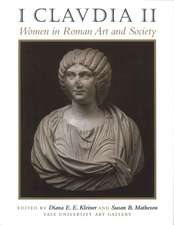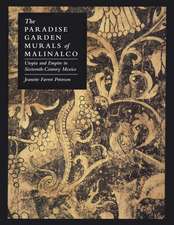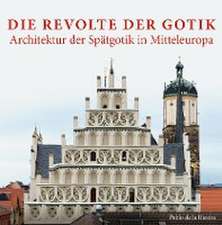Portraying the Aztec Past: The Codices Boturini, Azcatitlan, and Aubin: Recovering Languages and Literacies of the Americas
Autor Angela Herren Rajagopalanen Limba Engleză Paperback – 12 dec 2018
In Portraying the Aztec Past, Angela Herren Rajagopalan offers a thorough study of these closely linked manuscripts, articulating their narrative and formal connections and examining differences in format, style, and communicative strategies. Through analyses that focus on the materials, stylistic traits, facture, and narrative qualities of the codices, she places these annals in their historical and social contexts. Her work adds to our understanding of the production and function of these manuscripts and explores how Mexica identity is presented and framed after the conquest.
Preț: 204.08 lei
Nou
Puncte Express: 306
Preț estimativ în valută:
39.05€ • 40.77$ • 32.32£
39.05€ • 40.77$ • 32.32£
Carte disponibilă
Livrare economică 14-28 martie
Livrare express 27 februarie-05 martie pentru 39.85 lei
Preluare comenzi: 021 569.72.76
Specificații
ISBN-13: 9781477316078
ISBN-10: 1477316078
Pagini: 208
Dimensiuni: 216 x 279 x 20 mm
Greutate: 0.68 kg
Editura: University of Texas Press
Colecția University of Texas Press
Seria Recovering Languages and Literacies of the Americas
ISBN-10: 1477316078
Pagini: 208
Dimensiuni: 216 x 279 x 20 mm
Greutate: 0.68 kg
Editura: University of Texas Press
Colecția University of Texas Press
Seria Recovering Languages and Literacies of the Americas
Notă biografică
Angela Herren
Rajagopalan is an associate professor of art history at the University of North Carolina.
Cuprins
- List of Illustrations and Tables
- Acknowledgments
- Chapter 1. Introduction: Portraying the Aztec Past
- Chapter 2. Codex Boturini: A Pictographic Paradigm
- Chapter 3. Master and Apprentice: The Multiple Artistic Hands in Codex Azcatitlan
- Chapter 4. Don Martín Ecatzin: Codex Azcatitlan’s Cosmic Hero
- Chapter 5. Traitors, Intrigue, and the Cosmic Cycle in Codex Azcatitlan
- Chapter 6. Codex Aubin and the Influence of Printed Books
- Chapter 7. Conclusion: Central Mexican Manuscript Painting in Transition
- Epilogue. Life after Production
- Appendix 1. Translation of the Nahuatl Glosses in Codex Azcatitlan
- Appendix 2. Translation of the Nahuatl Text in Codex Aubin
- Notes
- Bibliography
- Index
Recenzii
Beyond offering insights into the authorship, contents, and intended audience of the three codices, we are made to appreciate the evolving indigenous response to outsider influences as well as the interethnic jockeying evident as they protected their prerogatives and legacies within a new colonial order. It is this broader window onto the cultural context that makes [Portraying the Aztec Past] a valuable resource for both lay readers and scholars interested in Latin American studies, including anthropologists, historians, and art historians, as well as students of manuscript and book cultures.
Portraying the Aztec Past is an important work about the production of history. Rajagopalan shows how the dynamics of identity, both individual and corporate, shaped that production in the context of the formation of not one but two imperial worlds and their artistic, literary, historical, and cosmological frameworks.
[Portraying the Aztec Past exemplifies] the kind of rigorous scholarship that is driving the study of colonial indigenous documents toward a wider synthesis...[A] marvelous study, which should well serve as a model for much-needed comparative scholarship of Mesoamerican codices.
[Portraying the Aztec Past] provides a very clear and convincing interpretation of three very closely connected pictorial manuscripts and presents an outstanding contribution to the study of indigenous pictorial manuscripts of colonial Mexico.
Rajagopalan’s book is an excellent contribution to Mesoamerican manuscript studies and a compelling read for specialists and a more general audience alike. It is particularly notable for the focus on the materiality of the manuscripts, the artist and intended audience, and the social and political machinations that prompted their creation.
Rajagopalan has written a work full of telling examples, helping the specialist or the student with abundant information that could easily escape even the trained eye.
The value of this work, especially to historians working on the Spanish colonial Southwest, is in its understanding of the production and function of manuscripts.
[Portraying the Aztec Past] is built on extensive and well-established scholarship. [Rajagopalan] carefully examines the intertextuality or possible dependencies between the three pictorial manuscripts—each created in different moments of time—exploring when their narratives converge, how and why they diverge, as well as the ways in which their stories intersect with purely textual historical accounts. Her book also sheds light on the material aspects of these manuscripts, the identity of their Native authors, and their strategies or motivations.
Descriere
Offering the first extended comparison of three closely related painted manuscripts from colonial Mexico, this book reveals how differences in their materials and composition show the evolution of the native pictorial tradition.









